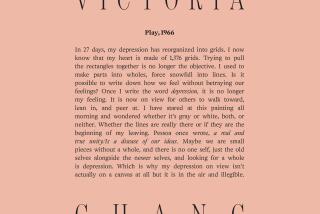Therapist Lori Gottlieb talks about the therapists that therapists go to
As a clinical psychologist, Lori Gottlieb was helping her patients fix their lives but couldn’t seem to handle her own. She was reeling from a catastrophic breakup, struggling with shame and confusion as she reckoned with midlife, and trapped in a contract to produce a book she didn’t want to write. The book, ironically enough, was to be about happiness. “Every time I tried to sit down and write it,” Gottlieb says, “it just felt like it wasn’t reflective of what I was seeing as a new therapist in the therapy room and the real nuances of what makes for a good life.”
In “Maybe You Should Talk to Someone,” Gottlieb – who also pens a regular advice column in the Atlantic – writes about her work with the pseudonymous Wendell, a therapist “from central casting,” she says, who ended up helping her find the freedom to cancel the happiness book. She also writes about work with her patients (with their permission, of course, and all identifying details changed), and her life outside the office.
“I didn’t know what book I was going to write next,” Gottlieb says, speaking with The Times from New York, where she is promoting “Maybe You Should Talk to Someone.” “When I was freed up from not being under that contract, I started writing one night, and the book I started writing was about the big questions that I wanted to be writing about originally in the happiness book. And that became this book.” The book has just been optioned for television.
So what can you tell us about the upcoming television project?
The book has been optioned by Eva Longoria’s company. I’m very excited about it, because I really want a portrayal of a therapist that changes the way people think about therapy.
Can you tell me a little more about that?
I think recently there are some really good portrayals of therapists out there, but they aren’t necessarily the center of the show. [With this project] it would just be a person in the world, and like many people she goes to therapy and yes, she happens to be a therapist. It’s about a person who happens to be a therapist and her life and her family and her patients and their lives — a little like the way that “This Is Us” just so beautifully takes these people’s lives and you get invested in all the different interwoven stories.
What do you think television and movies tend to get wrong about therapy? What misperceptions do they perpetuate?
I think one misperception is that if you go, you will be there forever. And that’s not what therapy is at all. Therapy very much has an endpoint. Also, it’s not like you come and you just talk about whatever you talk about and you leave; you’re working hard in therapy. And I don’t think they ever show the kind of work that a patient has to do. You can have all the insight in the world, but if you don’t make change out in the world, it’s useless. And so I hope that in the show we show the patients outside the room and we show what they are or are not doing in terms of really changing.
How can you tell when the therapy that you’re doing — whether you’re the therapist or the patient — is working?
When you see that the person is feeling more at peace. Let’s say that they were depressed; they’re feeling less depressed. If they were anxious, they’re feeling less anxious. If they were easily injured by other people, they’re less easily injured. They were afraid of taking risks. Now they’re going to apply for jobs that they were afraid to apply for before. It’s very concrete. It’s measurable.
What do you think that patients would be most surprised to learn about their therapist?
How much we think about them. I think that people think that they leave the room and that we don’t think about them. But you know, we think about them, they affect us. They hold up a mirror to us as much as we hold up a mirror to them.
Having been on both sides of that couch, is it more difficult being a therapist or being a patient in therapy?
I think they’re equally hard, but in different ways. I talk in the book about how being in therapy is a little bit like physical therapy: It might be hard and painful when you’re there, and even when you leave you might have muscle aches and things like that, but if you keep at it, eventually the pain will go away or it will lessen. I think therapy is also really hard for patients because it forces them to let another person see them in ways that often we choose not to be seen. And I think that’s a really hard thing is to say, this is me. This is who I am. I’m going to say the truth that I’m too afraid to show even the people that I loved the most in my own life. That’s hard.
What’s harder: Working as a therapist or writing about working as a therapist?
Definitely working as a therapist. When you’re writing you have the luxury of reflection, and when you’re in the therapy room you’re in real time and you have to be so focused. You’re listening to what the person is saying. You’re watching the body language. You’ve got to be alert. And it’s really hard because you don’t want to be measuring every word and you want to have an organic conversation, but everything you say is also very, very intentional. I’m tired after 50 minutes. It’s just really intense work.
You write in the book about one of your patients who’s a television producer, and he’s kind of a major jerk. Now that your career’s taking a turn toward that kind of work, are you approaching it with trepidation or excitement?
I’m a producer on the show, and I know that world from when I used to work in film and television in my 20s. Of course I’m excited! I really want to tell a good story. If you can tell a good story and reach so many people at once, I think that will be revolutionary for the therapy world. Just getting people to talk about their emotional lives and their inner worlds and their struggles much more openly. I think if you can get lots of people every week watching something like that – it’ll be entertainment, of course, but it can also do people a service.
::
“Maybe You Should Talk to Someone: A Therapist, Her Therapist, and Our Lives Revealed”
Lori Gottlieb
Houghton Mifflin Harcourt, 415 pp., $28
::
Lori Gottlieb at the Los Angeles Times Festival of Books: Gottlieb will appear at 1 p.m. on April 14 in conversation with Chris Erskine, Cathy Guisewite, Heather Havrilesky and Mary Laura Philpott.
Tuttle is the president of the National Book Critics Circle.
More to Read
Sign up for our Book Club newsletter
Get the latest news, events and more from the Los Angeles Times Book Club, and help us get L.A. reading and talking.
You may occasionally receive promotional content from the Los Angeles Times.






